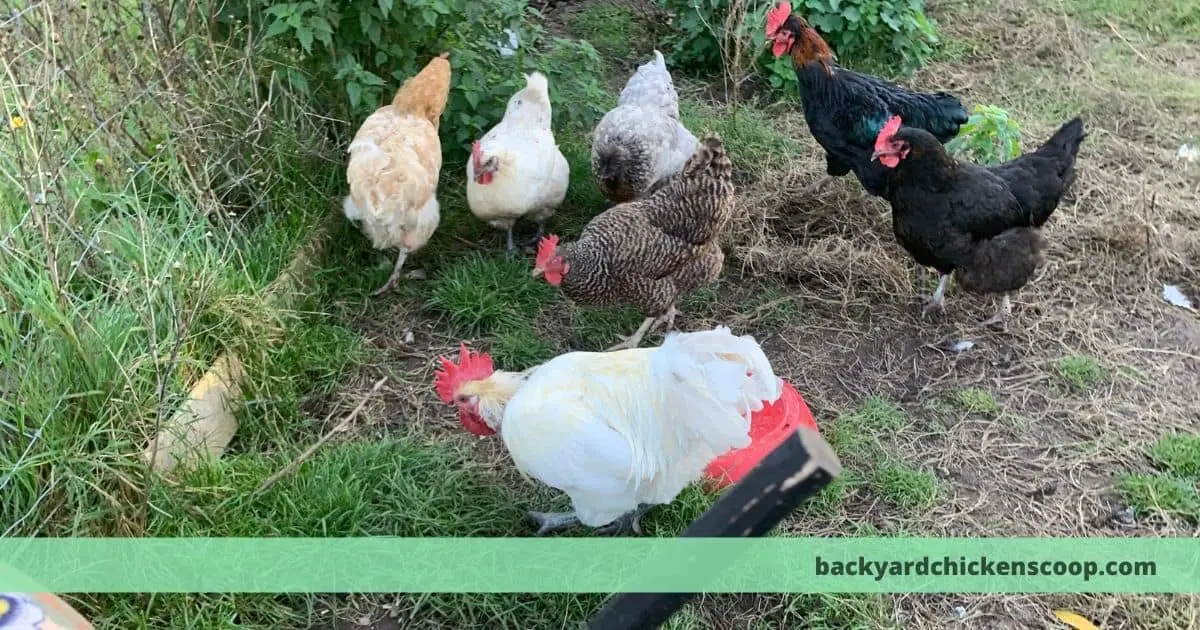With the rising demand for poultry products and a heightened awareness of environmental impacts, the question arises: How sustainable is our chicken farming? As someone who enjoys the company of pet chickens in my backyard, I’ve always been curious about the broader world of poultry farming.
In this article, we’ll dive deep into the environmental footprints of organic and conventional poultry farming, shedding light on the advantages and drawbacks of each.
The environmental benefits of backyard chickens include waste minimization through kitchen scrap recycling, soil enrichment with nutrients like nitrogen, phosphorus, and potassium, and natural pest control. It contrasts organic and conventional farming, showcasing organic’s advantages in reducing emissions through crop rotation, conserving water, and minimizing chemical runoff. Advocating for free-range and organic practices, the piece emphasizes their role in promoting local food systems, biodiversity, and education on sustainable living, while avoiding the use of antibiotics and hormones, thus underscoring their ecological superiority.
Environmental benefits of backyard chickens
Raising backyard chickens can have several environmental benefits, contributing positively to a more sustainable way of living. Here are some of the key environmental advantages:
- Waste Reduction: Chickens can consume kitchen scraps, reducing the amount of organic waste that ends up in landfills. By converting food waste into eggs, they provide a practical example of recycling and reducing food waste.
- Soil Improvement: Chicken manure is a high-quality fertilizer rich in nitrogen, phosphorus, and potassium. When properly composted, it can improve soil health and structure, boosting the productivity of home gardens without the need for chemical fertilizers.
- Pest Control: Chickens naturally forage for insects and can help reduce the population of pests in your garden, such as slugs, snails, and some plant-eating insects. This biological pest control can diminish the need for chemical pesticides, leading to a healthier garden ecosystem.
- Promotion of Local Food: Backyard chickens contribute to local food systems by providing eggs (and sometimes meat) with a very low carbon footprint compared to store-bought alternatives. Transport and packaging emissions are virtually eliminated, supporting a more sustainable and resilient local food supply.
- Education and Awareness: Raising chickens can increase environmental awareness and connection to food sources. It offers educational opportunities for families to learn about animal care, the origins of food, and the importance of sustainable living practices.
- Biodiversity: In some cases, keeping backyard chickens can support genetic diversity by raising heritage breeds that are not commonly found in commercial poultry operations. Preserving these breeds can contribute to the overall health and resilience of domesticated chicken populations.
- Reduced Use of Antibiotics and Hormones: Backyard chickens are often raised in more humane conditions than those in commercial operations, leading to less need for antibiotics and hormones. This can have a positive impact on both the environment and human health by reducing the prevalence of antibiotic-resistant bacteria.
While there are clear environmental benefits, it’s important to consider local regulations, potential challenges such as noise, odors, and predators, and the commitment required to care for animals responsibly.
Organic vs. Conventional: The Environmental Footprint Face-off
Carbon Footprint & Greenhouse Gas Emissions
- Organic Farming: Organic farms, in general, have a lower carbon footprint compared to conventional ones. This is primarily because organic farming often employs practices like crop rotation, which reduces the need for synthetic fertilizers and pesticides. By relying on natural processes, organic farms emit fewer greenhouse gases.
- Conventional Farming: Conventional poultry farms, especially large-scale operations, rely heavily on synthetic inputs and energy-intensive practices. This can lead to higher emissions of greenhouse gases.
Water Usage and Quality
- Organic Farming: These farms typically use less water due to their reliance on natural rainfall and efficient irrigation systems. Moreover, the absence of synthetic chemicals means less contamination of water sources.
- Conventional Farming: Intensive farming practices can lead to excessive water use. Additionally, runoff from these farms, laden with chemicals, can contaminate local waterways.
Organic Farming’s Role in Reducing Water and Soil Contamination
One of the standout benefits of organic chicken farming is its potential to reduce water and soil contamination.
- Absence of Synthetic Chemicals: Without the use of artificial pesticides and fertilizers, there’s a significant reduction in the pollutants that can leach into the soil and eventually, our water sources.
- Natural Manure: Organic farms often use chicken manure as a natural fertilizer. This not only recycles waste but also reduces the need for synthetic fertilizers that can contaminate waterways.
- Healthy Soil Practices: Organic farming promotes soil health through practices like composting, cover cropping, and reduced tilling. Healthier soil can better filter and purify water, reducing contamination risks.
Free-Range Farming: A Boon for Soil Health and Biodiversity
Free-range farming isn’t just about happy chickens; it’s also about the environment.
- Soil Health: When chickens are allowed to roam freely, they naturally till the soil with their scratching. This aerates the soil, increases its water retention capacity, and enhances its fertility.
- Natural Pest Control: Chickens love to snack on insects, which means they can help control pest populations without the need for chemicals. This can lead to a decrease in the use of pesticides, further promoting biodiversity.
- Biodiversity: Free-range farms often have a diverse ecosystem. This is because they’re not just monocultures of chickens but also include various plants and other animals. This diversity creates a balanced and resilient ecosystem, reducing the risk of disease outbreaks and promoting overall environmental health.
In Conclusion
As we sit back and savor our chicken dishes, it’s worth pondering the journey from farm to fork. Organic and free-range chicken farming methods offer significant environmental benefits over conventional ones. By supporting these practices, consumers can play a part in promoting a more sustainable and healthier planet. As for me, every time I look at my backyard chickens, I’m reminded of the broader picture – a world where farming harmonizes with nature.


